Everything You Need to Know About Farm Fresh Eggs
Curious about farm fresh eggs? Learn what makes them different, from yolk color to shell thickness, and how to cook with them like a pro!
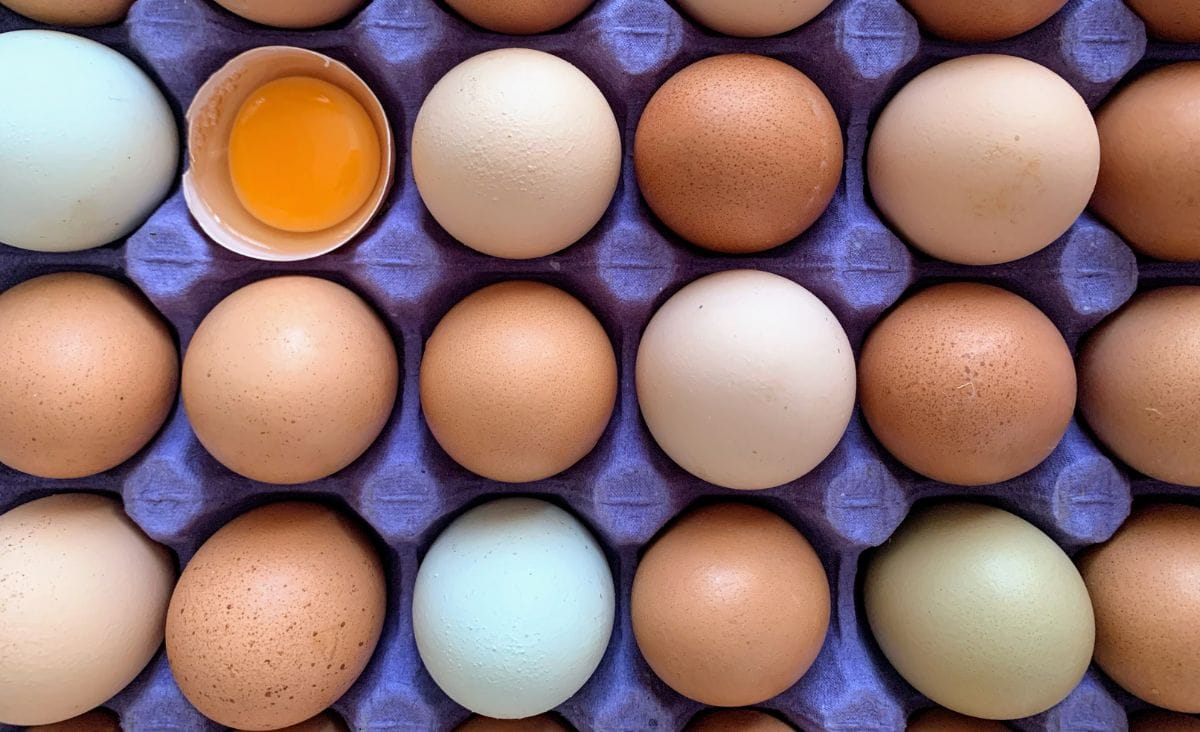
Cracking open a farm-fresh egg for the first time can be a little shocking—deep golden yolks, thick shells, and eggs of all shapes and sizes. If you’re used to grocery store eggs, you might have a lot of questions. Why are the yolks so dark? Do different egg colors taste different? And what’s up with that tiny blood speck?
Not all farm-fresh eggs are the same. Check out the differences between guinea and chicken eggs to see how they differ in taste, size, and shell strength.
As more people turn to local farms and backyard flocks for their eggs, it’s important to understand how they differ from store-bought varieties. This guide will answer common farm-fresh egg questions, covering everything from egg sizes and yolk color to shell thickness and baking conversions. Whether you’re buying from a farmer, collecting from your own hens, or just curious about what makes farm-fresh eggs unique, this post has you covered.
Egg Size & What It Means
Not all eggs are created equal! While store-bought eggs come in neat, uniform sizes, farm-fresh eggs can vary significantly. So, how exactly are egg sizes determined?
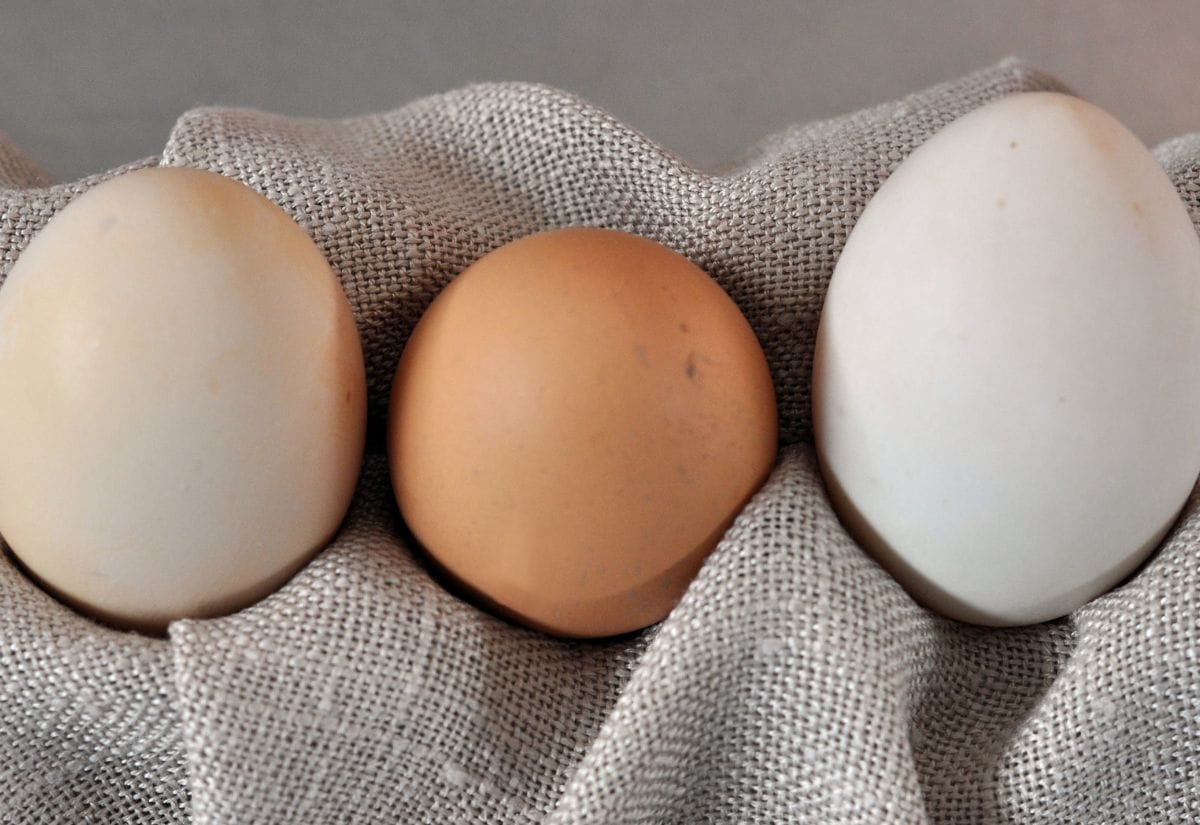
How Are Egg Sizes Determined?
At grocery stores, eggs are sorted by weight using conveyor belts to ensure uniform sizing. Here’s how they break down:
- Jumbo: 2.5 oz
- Extra-Large: 2.25 oz
- Large: 2 oz
- Medium: 1.75 oz
- Small: 1.5 oz
Backyard farmers may not sort eggs at all, and sizes in a single carton can vary. If you’re baking and need precision, weighing eggs or using a conversion chart helps adjust recipes accordingly.
Do Older Hens Lay Larger Eggs?
Yes, but genetics play a role too. Some breeds, like Barnvelders, naturally lay jumbo eggs, while bantams lay tiny ones. Young hens start with small pullet eggs and gradually lay larger eggs as they mature. Older hens may lay fewer eggs, but they’re often larger.
Egg Yolk Color & What It Means
One of the first things people notice about farm-fresh eggs is the deep, golden yolk. But what exactly causes this difference, and does it mean the egg is healthier?
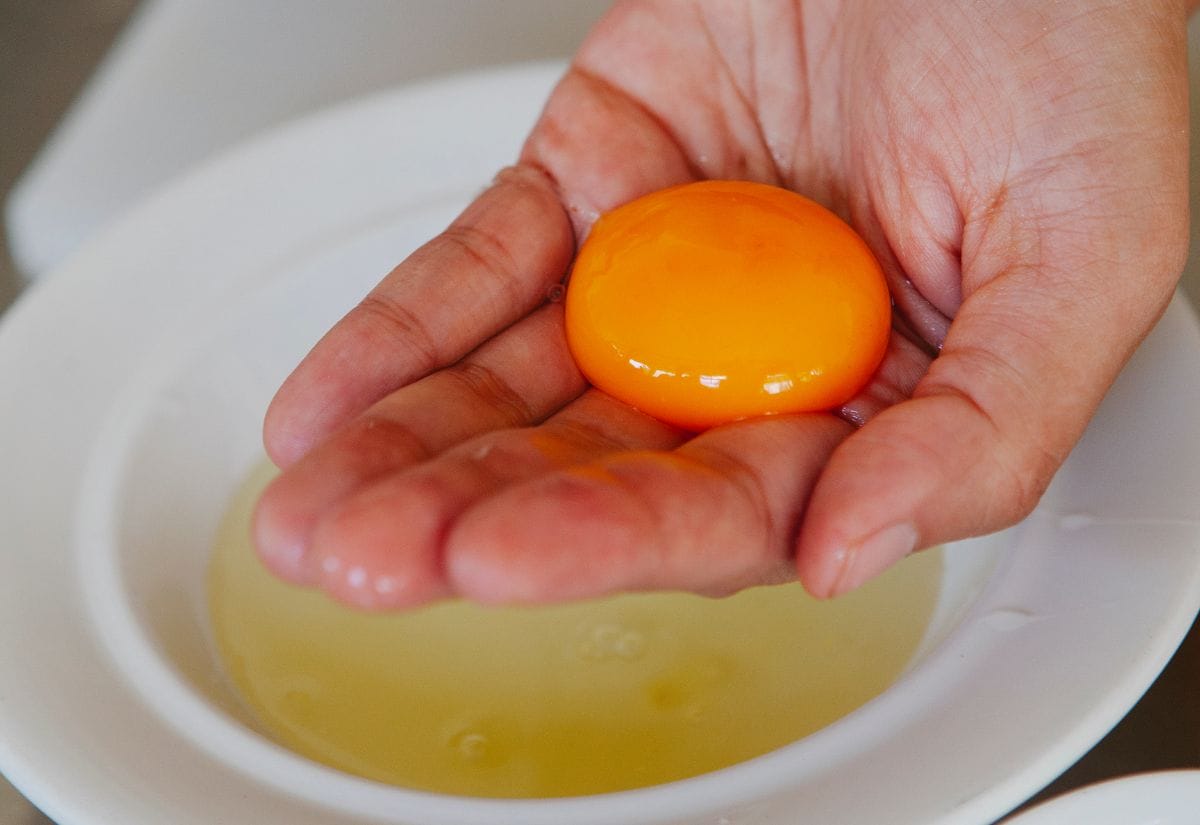
Why Are Farm Fresh Yolks Darker?
That rich, golden yolk color comes from the chicken’s diet. Hens that forage for insects, greens, and seeds produce darker yolks. Foods that enhance yolk color include:
- Dark leafy greens (kale, spinach)
- Marigolds (bright orange yolks)
- Corn & grains (paler yolks if fed in excess)
- Protein sources (bugs, mealworms)
Does Yolk Color Affect Nutrition?
A darker yolk indicates a varied, nutrient-rich diet, but color alone doesn’t change the egg’s nutritional value. However, pasture-raised hens tend to produce eggs higher in Omega-3s and vitamins compared to commercial eggs.
What Causes a Double Yolk?
A double yolk occurs when a hen releases two yolks instead of one before the shell forms. This happens most often in:
- Young hens just starting to lay.
- Older hens near the end of their laying cycle.
- Certain breeds (like Rhode Island Reds and Leghorns), which are more prone to laying double-yolked eggs.
Double yolks are safe to eat and often a fun surprise in the kitchen!
Egg Shell Color & Thickness
Shell color is one of the most debated topics when it comes to eggs. Some people believe brown eggs are healthier than white ones—but is there any truth to that?
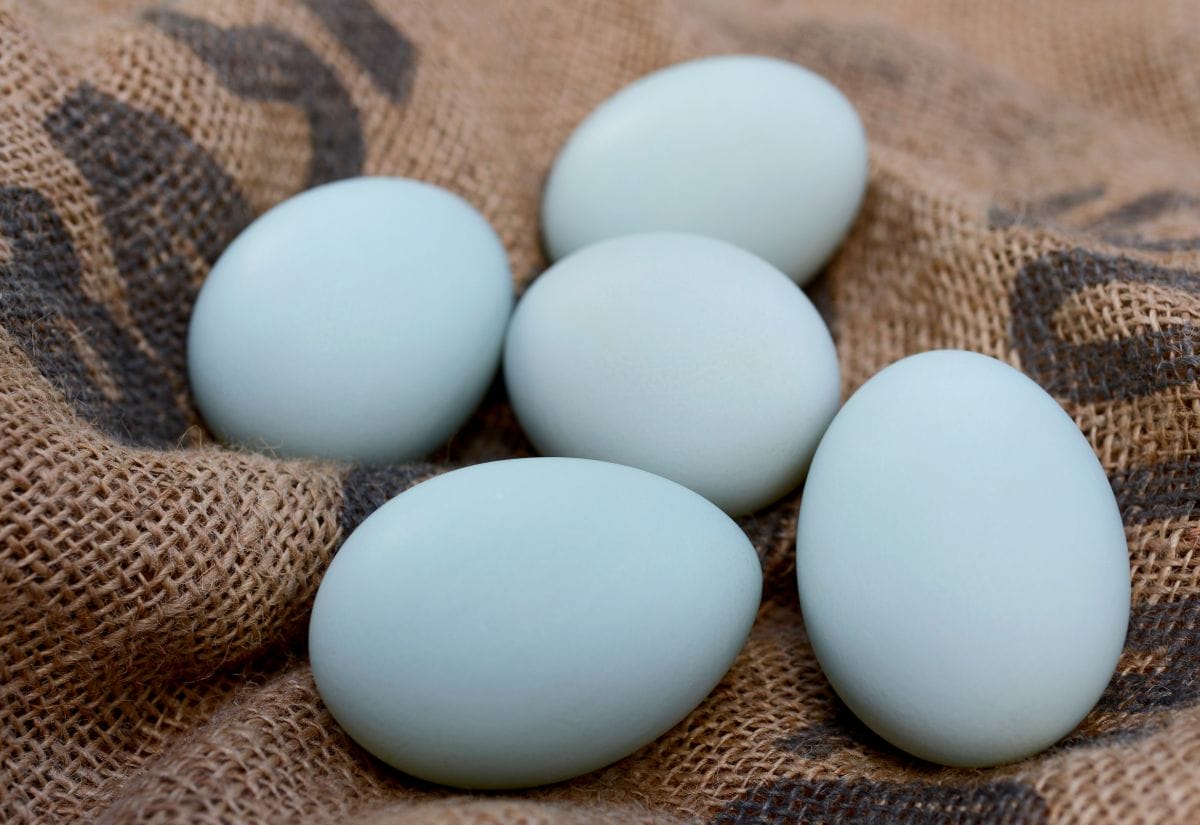
Are Brown Eggs Healthier Than White Eggs?
Nope! Shell color is purely genetic. Some breeds lay white eggs (Leghorns), some lay brown (Rhode Island Reds), and others lay blue or green (Easter Eggers).
Are White Eggs Thinner Than Brown Eggs?
Not necessarily. Shell thickness depends on breed, age, and diet. Older hens sometimes lay thinner-shelled eggs, and chickens with a poor calcium intake may produce fragile eggs regardless of shell color.
Can a White Chicken Lay Brown Eggs?
Yes! Ear lobe color is a better indicator of egg color. Most white-earlobe chickens lay white eggs, while red-earlobe chickens lay brown eggs. (Unless they’re Easter Eggers—then all bets are off!)
Cooking & Baking with Farm Fresh Eggs
If you love to bake, you might be wondering how to adjust for the varying sizes of farm-fresh eggs. Here’s a simple guide to making sure your recipes turn out just right.
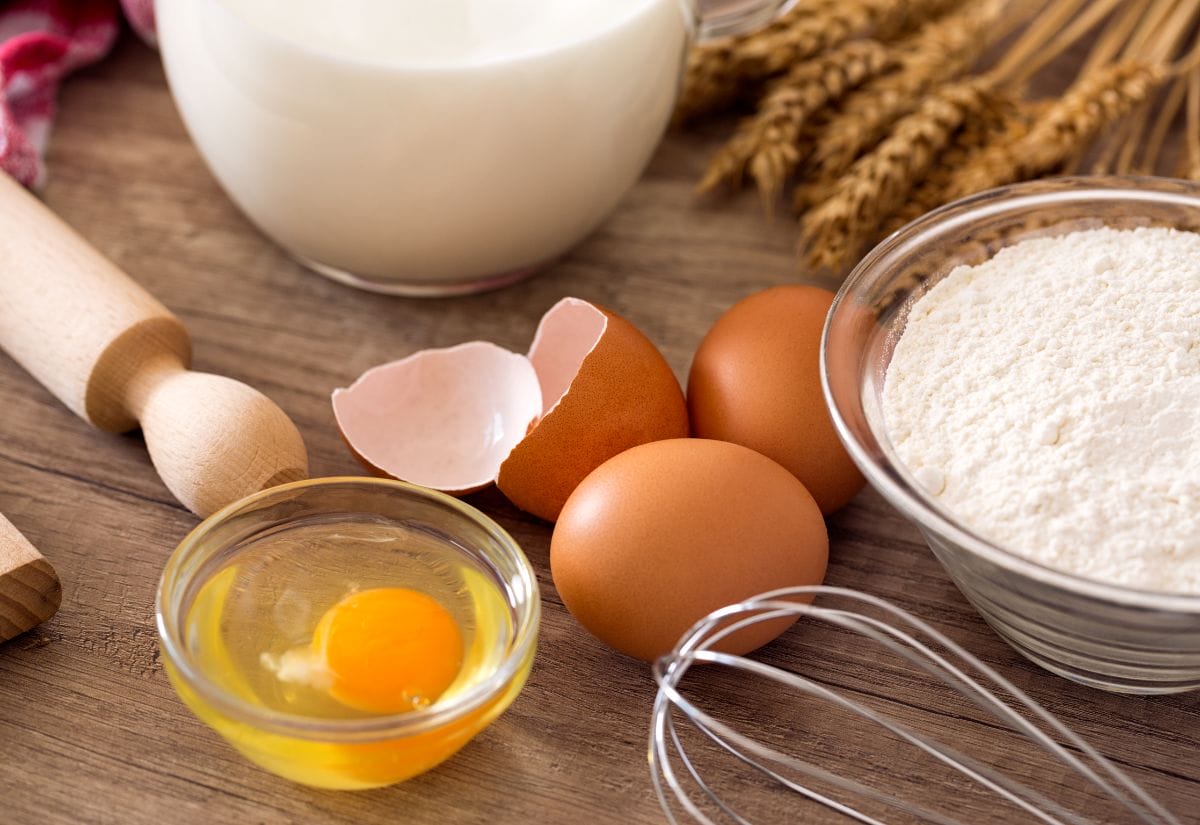
How Do You Substitute Egg Sizes in Recipes?
If a recipe calls for large eggs, here’s how to adjust:
- 1 large egg = 1 medium + 1 extra yolk
- 1 large egg = 1 small + extra white
- 1 large egg = ⅔ of a jumbo egg
Do Farm Fresh Eggs Cook Differently?
Farm fresh eggs may look and feel different when cooking compared to store-bought eggs because:
- They have firmer whites due to freshness.
- Yolks are richer and more vibrant, affecting color in baking.
- They require lower heat when frying or scrambling because the whites cook more quickly.
Are Duck Eggs Better for Baking?
Duck eggs have more protein and less water, making them excellent for baking. They can be used 1:1 for large chicken eggs in most recipes but result in fluffier, richer baked goods.
Common Farm Fresh Egg Myths & Facts
There are plenty of myths about farm-fresh eggs, from taste to nutrition. One of the most common questions is whether different shell colors mean different flavors.
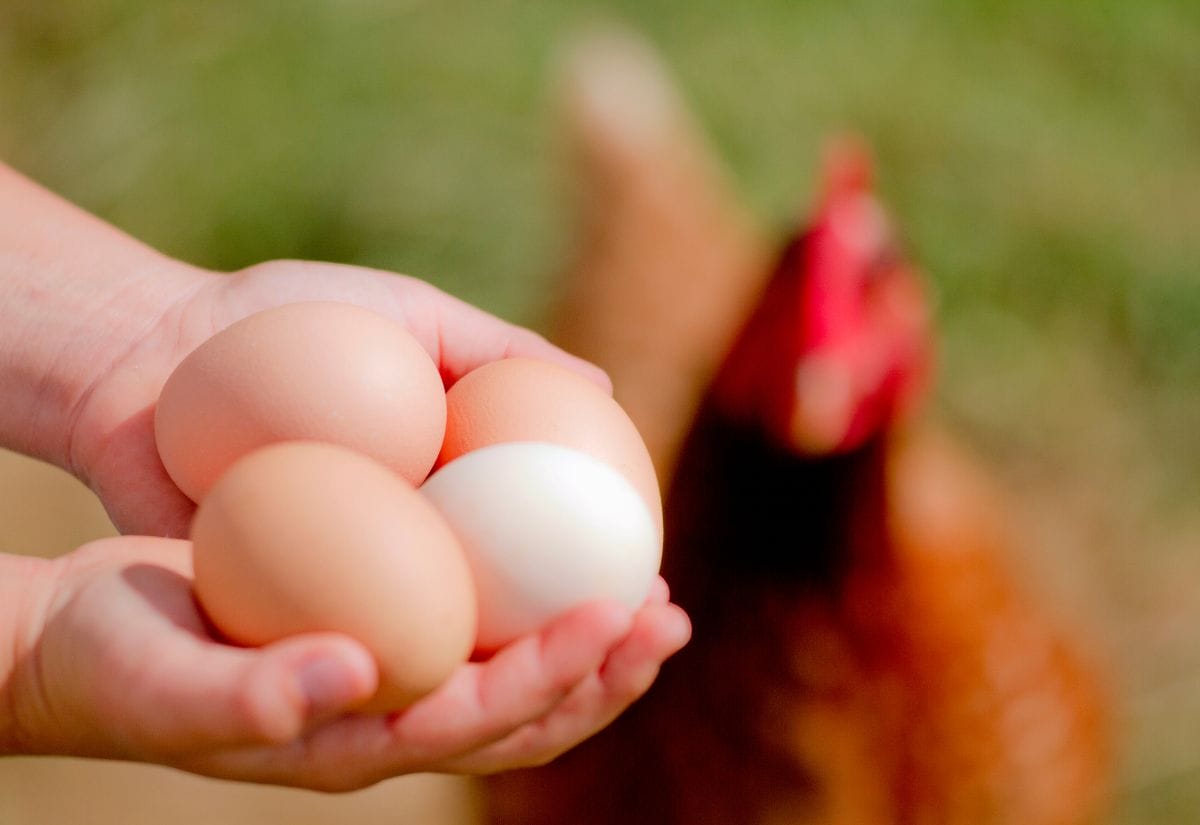
Do Egg Colors Affect Flavor?
Some people swear by differences, but egg color doesn’t impact taste. Flavor is influenced by diet—pasture-raised hens may produce eggs with a richer taste due to a varied, natural diet.
What Are Blood Spots & Meat Spots in Eggs?
Sometimes, when you crack an egg, you’ll notice a tiny red or brown speck on the yolk or in the white. These are:
- Blood spots: Caused by a small blood vessel rupturing during egg formation.
- Meat spots: Tiny bits of tissue from the hen’s reproductive system.
Does a Blood Spot Mean the Egg Is Fertilized?
Nope! Fertile eggs have a clear “bullseye” on the yolk, while blood spots result from a broken blood vessel during egg formation. They’re safe to eat but can be removed if preferred.
Are Fertilized Eggs Safe to Eat?
Yes! Fertilized eggs are no different in taste, texture, or nutrition from unfertilized eggs. Fertilization only means the egg could develop into a chick, but this won’t happen unless incubated at the right temperature for several days.
Storing & Handling Farm Fresh Eggs
Proper storage and handling can extend the shelf life of farm fresh eggs and keep them safe to eat. But just how long do they stay fresh, and does it matter whether they’re washed or unwashed? Let’s break it down.
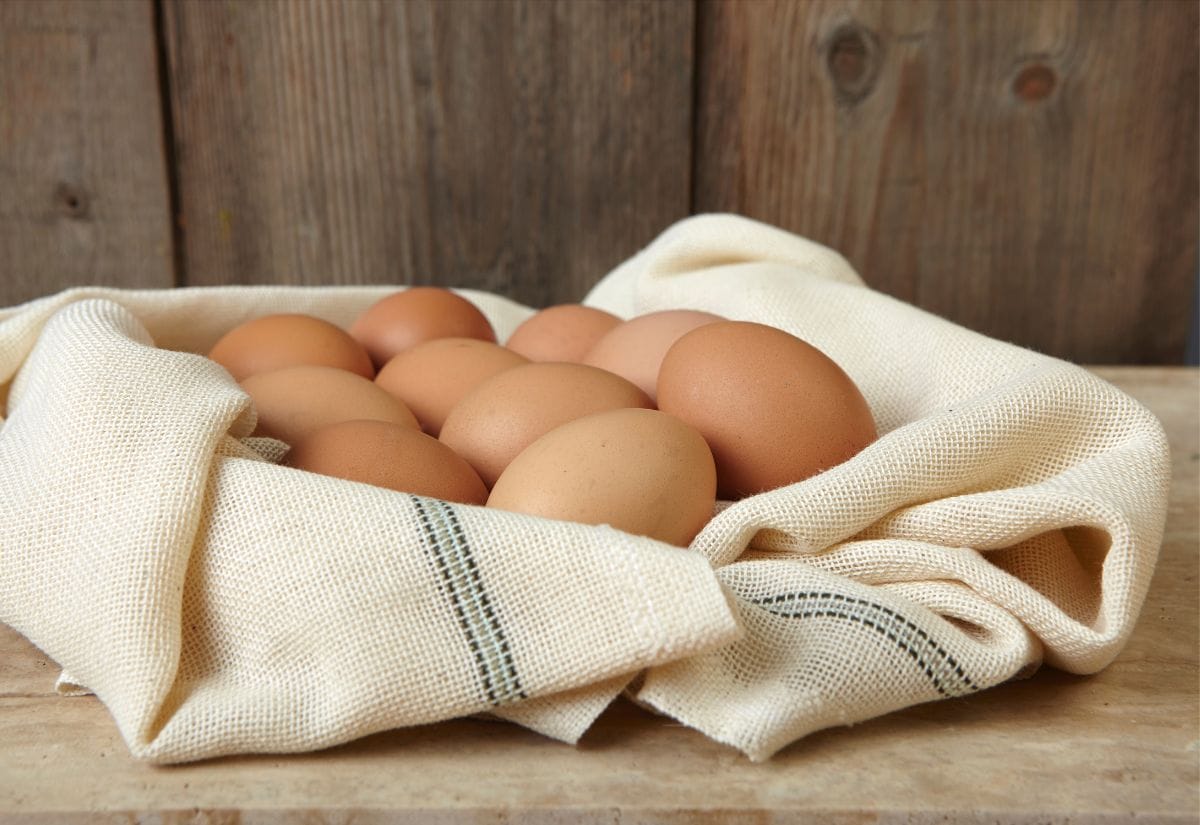
How Long Do Farm Fresh Eggs Stay Fresh?
One of the biggest perks of farm fresh eggs is their long shelf life. But how long do they actually last?
- Unwashed eggs (with the bloom intact) can stay fresh at room temperature for 2-3 weeks and in the refrigerator for 3-6 months.
- Washed eggs should be refrigerated immediately and typically last 2-3 months in the fridge.
- Eggs older than 3 months may still be safe, but their quality (firmness, yolk strength) may start to decline.
Should You Wash Farm Fresh Eggs?
Unlike store-bought eggs, farm fresh eggs have a natural coating called the bloom, which helps keep bacteria out and moisture in. Washing removes this protective layer, making eggs more susceptible to contamination.
- If you plan to store eggs at room temperature, do not wash them.
- If eggs are dirty, use a dry cloth or soft brush to wipe off debris.
- If you must wash eggs, use warm water (never cold) and dry them immediately before refrigerating.
Only wash eggs right before using them to preserve their freshness as long as possible.
How Do I Check If an Egg Is Still Fresh?
Not sure if an egg is still good? Use these simple methods:
The Float Test
- Fill a bowl with water and gently place the egg inside:
- Fresh eggs sink and lay flat on the bottom.
- Slightly older eggs stand upright (still safe to eat).
- Bad eggs float—they should be discarded.
Candling (Holding an Egg to Light)
- Hold the egg up to a bright light or flashlight in a dark room.
- Fresh eggs will have a small air pocket at the wider end, while older eggs have a larger air pocket due to moisture loss.
Can You Freeze Farm Fresh Eggs?
Yes! If you have an abundance of eggs, freezing them is a great way to preserve them for later use.
How to Freeze Eggs Properly
- Whole eggs: Crack into a bowl, beat lightly, and pour into ice cube trays or silicone molds before freezing.
- Egg whites only: Separate yolks and pour whites directly into a freezer-safe container.
- Egg yolks only: Beat yolks with a pinch of salt or sugar to prevent them from thickening when frozen.
Frozen eggs should be used within a year for best quality.
Love farm fresh eggs? Pin this so you can revisit these tips anytime!
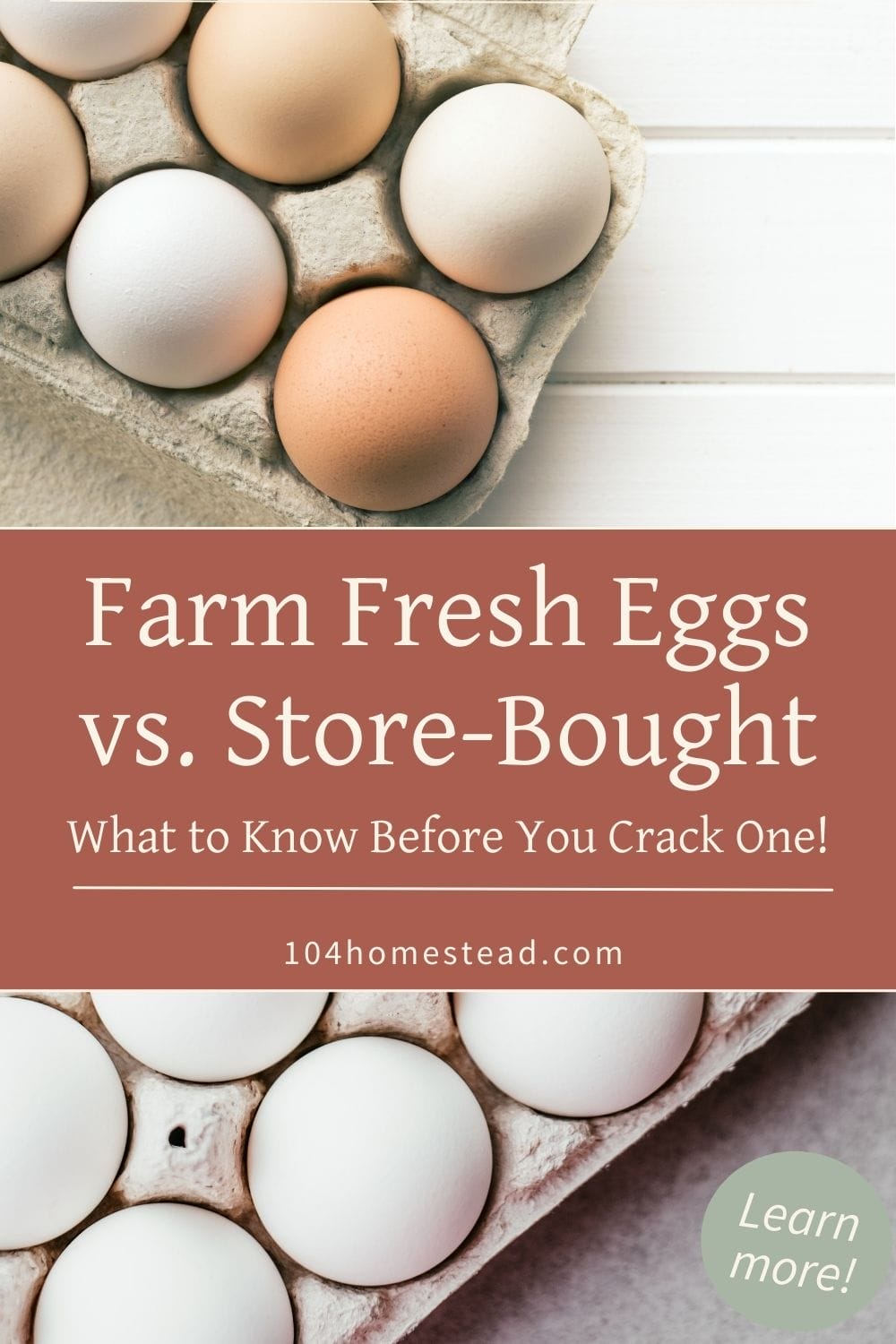
Farm-fresh eggs are a game-changer—whether you’re baking, cooking, or just enjoying the vibrant yolks. From understanding shell colors to perfecting baking conversions, knowing what makes them unique helps you get the most out of them.
If you’re bringing farm-fresh eggs into your kitchen, knowing how to handle them properly is key to keeping them safe and fresh. From storing and washing to cracking them just right, a few simple tricks make all the difference. Need to separate yolks from whites without the mess? There’s a quick hack for that. And if you’ve ever struggled with peeling hard-boiled eggs, I’ve got a foolproof method that will save you the frustration.
Do you prefer farm-fresh eggs over store-bought? Let me know your favorite part about farm eggs in the comments below!





Should I refrigerate them?
Hey there! You only need to refrigerate your eggs if you’ve washed them. Fresh, unwashed eggs can stay at room temperature for 2-4 weeks.
Thank you so much for this article. I’m new to being a chicken mama. My chickens are new and started laying eggs a couple months ago. I also have a rooster. I noticed when I crack open some eggs there a significantly sized whitish circle on the yolk. Not a spot, but sometimes a 1/8” to 1/4” whitish circle on the yolk. Do you know what this is and should I have concern.? I have never seen this on a commercial egg.
Hi, I have some hard boiled eggs that had a perfect white spot sitting in the middle of the boiled yoke. I was curious if that meant the egg was fertilized or not? I have 11 chickens. All are female (I’m like 95% sure).
I don’t know so here goes with what might be one of those,”There are no stupid questions.”
Do you wash eggs that you haven’t refrigerated (farm fresh) just before cracking to put into a recipe or just before vooking?
I don’t wash before use unless they’re gross. And there truly aren’t any stupid questions. We all have to start somewhere, am I right?
I never knew there was a way to identify a fertilized egg! Thanks for the information ?.
What makes a yoke firm? I have cracked eggs and the yoke is so thick it will not beat up it just clumps?
This was very helpful, thank you.
Annette
Some of my local eggs are blue. I can’t manage to eat them because I read the blue tint comes from a virus similar to HIV but not harmful to me and the eggs are safe to eat. Is this true?
If so the Americana and other chickens whom lay blue eggs are they related to this virus?
That is false. You can read more about what makes the egg blue here: https://104homestead.com/anatomy-egg-color/ They are completely safe to eat.
I saw a picture of your boots on Facebook and there were some mahogany colored eggs in the photo. What breed of chicken were they from? Marans?
Copper Marans
I’ve just got 4 hens and a rooster. He was surpose to be a hen but to my delight I get to him him crow every morning while drinking my coffee. No eggs yet but I was wondering if eggs can be frozen to cook with later and what is the refrigerator life of an egg. Also I have bought fresh eggs and find it hard to remove the shell when boiling. Any tricks.
Eggs can be frozen. One of the popular ways to do it is to crack and egg into each cup of an ice tray. That way they are single serve when you need them. Fresh eggs last quite a long time, especially if you keep them unwashed. Check this out: https://104homestead.com/egg-safety/
For peeling tips, Prairie Homestead has a great article: http://www.theprairiehomestead.com/2014/04/the-easy-way-to-peel-farm-fresh-hard-boiled-eggs.html Those fresh eggs can be a challenge.
What if the whites are really watery?
Watery whites usually indicate an egg is older. If you know the egg is fresh, it may be a sign that there is illness in the flock.
I have some large eggs that have a milky or runnie white why does it do that?
Dawn,
Are these eggs from your own hens or from someone else?
Sometimes a cloudy white comes from an egg that has gotten very cold or frozen and thawed.
I Get eggs from a local source. Sometimes I get eggs with cloudy or milky yolks. What causes that? Are they safe to eat?
Is the yolk cloudy or the whites? Cloudy egg whites are an indicator that the egg is very fresh. They clearer the whites are, the older the egg is. If the yolk is cloudy… well, I’ve never experienced that and it makes me wonder. If you have a photo, feel free to email it to me and I’ll take a look.
Thanks for sharing the information. I had been curious…and now I have answers!
I’m so glad to help!